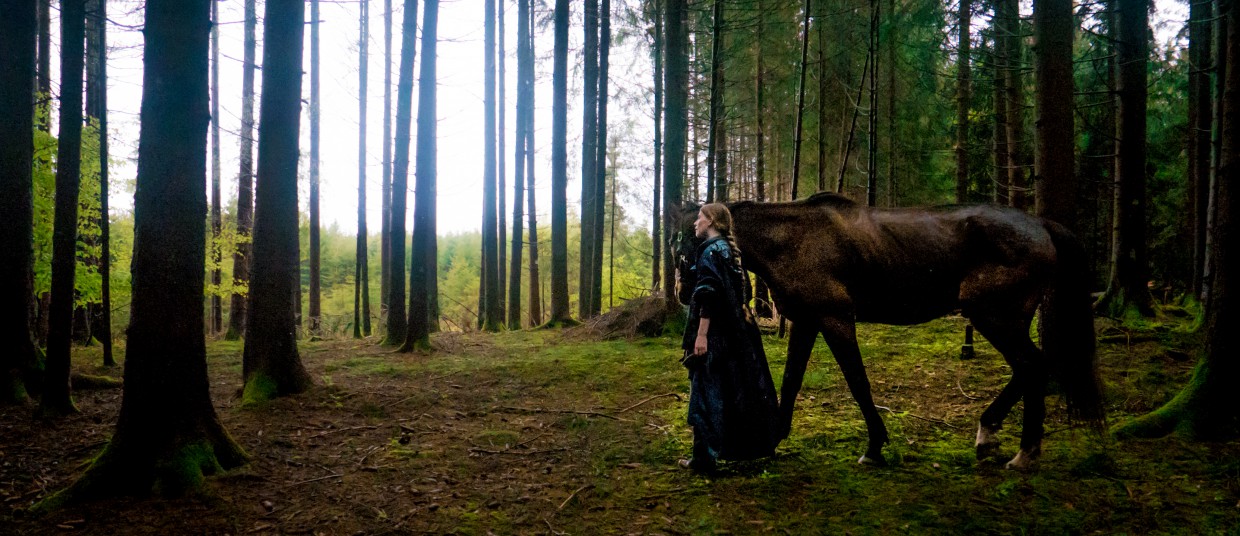The other day I was doing some, as I call it “senior dressage” training with Wesley in the arena and another horse trainer who’s professional opinion I hold in high regard was watching and commented on how hard the old boy is still trying, positively “marching” for me. Of course, this made me grow a few centimetres in my saddle – but most notably, Wesley really started showing off then, throwing his legs in an extended trot and swinging his back like a youngster.
This little exchange of nicety between two horse trainers made me think about why an arthritic 25-year old would still give his all to please me.
I’ve come to the conclusion, that he must think he still is a super star. Simply because I treat him like one.
I make a point of being respectful and polite with him, treat him with pride, love and trust and probably most importantly praise him profusely whenever I can.
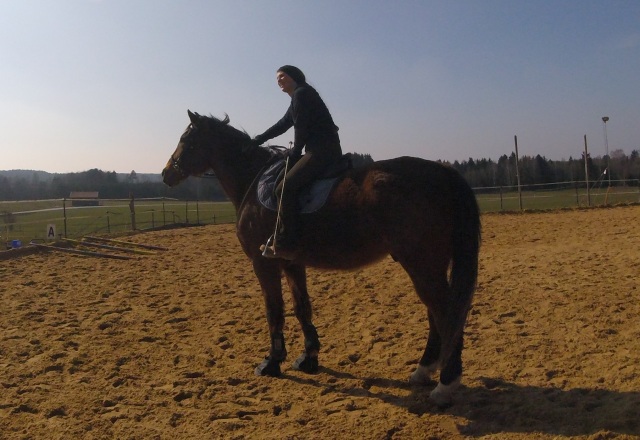
With an oldie (just as with a youngster) it is also very important not to fatigue them, doing long warm-ups, keeping sessions at about 30 – 50 minutes max. – depending on how he’s feeling on that particular day – and doing lots of interval work with very short burst of demanding manoeuvres and lots of stretching times in between.
I have never given a lesson and rarely watched anyone work with their horses where I wasn’t constantly saying (in the latter case usually thinking) “Praise your horse more!”. For some reason humans seem to have a filter in the head that sorts out everything positive and almost solely concentrates on the negative. It almost seems like they don’t see their horse trying for them: reaching a bit further, balancing themselves better, being a bit braver around spooky stuff, being more attentive, etc.
The main problem with this is that it’s not only unfair to ourselves, criticising our every move/word/thought, but it is hugely unfair to the horses we work with.
Try and put yourselves into your horse’s shoes:
“My human comes from time to time, pulls me out, grooms and saddles me and then he/she asks me for tricks.”
(Dressage, jumping, flying changes, smooth transitions, being brave as a lion on the trail, whatever it is – to your horse it’s probably all just tricks.)
Now pause for a moment and think of your horse and what it would say about you and doing “tricks” for you.
Is your horse going to say, “She’s alright, but she asks me things I don’t understand and then I’m confused and she’s unhappy – even though I try my best.”?
I think a lot of horses out there would say that. Because they are trained inconsistently and simply not praised enough for trying or even executing the right thing.
Or is your horse going to say, “She’s great, we do tricks together and she gets super-excited when I get it right. I think tricks are fun!”
Now that’s what everyone would want their horse to say about them. How do we get there? By simply being consistent with our aids, routines and especially with our praise.
I usually say to my student: Correct very little, praise a lot – praise so much and even the little things until you feel like an idiot.
It is our job to motivate our horses to give their all for us, if we fail to motivate and positively excite them, why should they even leave the barn with us?
Another reason for praising frequently and 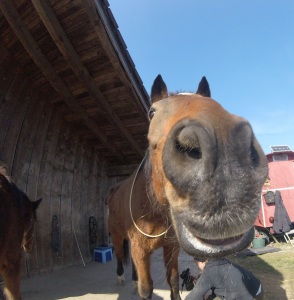 enthusiastically is it makes for confident, bullet-proof horses. I’m sure Wesley would say about himself: “I am a really good boy, I get all tricks right most of the time and my human has fun with me.”
enthusiastically is it makes for confident, bullet-proof horses. I’m sure Wesley would say about himself: “I am a really good boy, I get all tricks right most of the time and my human has fun with me.”
He knows for a fact he’s a good boy, since he get’s praised constantly – he receives that feedback, resulting in confidence. Does your horse get enough positive feedback?
Even though Wesley is very gentle and low in herd hierarchy, he is a very confident horse, always the first to pass a scary new object on the trail, no trouble with new things, he even wanted to see inside the beer tent they recently put up near his stable, other horses wouldn’t even go near and wanted nothing to do with it.
It’s easy for him to be brave, nothing bad ever happened to him, going out with humans is a fun diversion from paddock life and they always bring him back home save.
Horses are incredible animals – they will try and please their riders at all cost, even if they are in pain or haven’t always been treated kindly by humans.
Here’s an example of a young mare I’ve been helping to train for a while. Her owner bought her at the young age of five, it was evident that she hadn’t done much before. She would accept saddle and rider without a problem and could go straight lines in all three gaits fairly well – so I assumed she had been standing on a paddock most of her life, been taken out for a hack every now and then, but had never received proper training.
This particular horse is very delicately build, we assume half quarter-horse / half Arabian, rather small, slender and when she first arrived with next to no muscles in her back, hind quarters and neck.
Her new owner doesn’t have much experience with training horses, so she gave her to a Western trainer in our area. Now, this trainer (for whatever reason) deemed her fit to be ridden fully five times a week. So this young girl, after having been moved out of her quiet paddock life, was immediately started out to be ridden, she spent two months under an ill-fitting and heavy Western saddle and a harsh rider that asked way to much of her.
Until the little mare had had enough and just couldn’t be a good girl anymore. She started bucking or just laying down with a rider on top, rearing in hand and generally not behaving very well. It had gone so far that her new owner was starting to get afraid of her.
This is when her owner turned to me for advice and we changed her saddle to a much better fitting and lighter English jumping saddle. We trained her in hand and on the lunge for two months before starting to ride her again.
And she responded beautifully to a positive training approach, she quickly learned to lead well, tried her hardest to understand and execute new moves such as leg yields and generally turned into a gentle and motivated little horsey.
Turned out, we still underestimated how bad her muscle sores had become from the abrupt and overwhelming training she had received, in addition there was often not enough time to keep the intervals between groundwork sessions short enough to build muscle mass. She started to refuse galloping on the left, even though she still seemed to be very motivated and trying hard to please her handler with whatever else we asked from her.
So we stopped riding her again to wait until she can be checked out by a vet and treated by an osteopath. Last week the vet had suspected the worst: “kissing spines”! Her owner and I were devastated!
But thankfully the x-rays showed nothing, so we could breathe easy and continue the investigation. The osteopath assessed and treated the little mare and explained how she is just extremely sore and tight in her back muscles and needs more ground training to loosen her up again and build strong muscles for riding. Happy to have an agenda now, her training goes on!
This little mare impressed me hugely, by being such a good girl and trying hard to please us humans even though she was just not capable yet of carrying a rider. And this is why it’s so important to listen to your horse and have it checked out as soon as their behaviour changes. She just tried to tell us about her back pains!
Another example is a former client’s Shetland pony mare. This client had bought the pony at 5 years old for her 6-year old daughter as a riding pony.

The little pony had had a rough life before on a farm where she would carry around different children all day in a riding school and would even be rented out for trail walks with inexperienced and often incompetent parents leading the little horses. Reportedly, she even had to give birth to a foal with her saddle still on!
At six years old, when I met her, it quickly became apparent that she didn’t like adults with whips in their hands. In fact, she would attack you straight on when you tried to lunge her with a whip in hand to defend herself – brave little girl!
She wasn’t what you would call an easy children’s pony. She was still very young and liked to run, she would buck on the lunge like a rodeo horse and was spooky out on the trail.
I gave riding lessons to the little girl who is her human and it would amaze me every single time how that little mare seemed to become a different horse once the adults quit chasing her in circles and it was time for her human to mount her. Even on very wild days, she would be visibly relieved when her little girl approached for her riding lesson and would proudly carry her around the arena, always on her best behaviour.
The little mare loved her child, probably simply because the child loved her – with an unconditional intensity and honesty only children can love their pets with. That little girl was remarkably patient with her little proud horse and patted and praised her all the time, so it was an easy choice for the little mare to be a good girl.
Try and be more like a child with its pet, love it and praise it as much as you can.
After all, as a child you probably though of horses as these magical, proud creatures majestically galloping over meadows, flashing their tails and showing off.
Let’s try and give our horses back the dignity they deserve! A horse wants to be proud and feel good about itself just as much as we do. Next time you work with your horse, look at it with a child’s awe, be proud of how it moves and praise it for every little thing it does right – you’ll see, it’ll work wonders on your buddy’s motivation and he’ll work even harder.
A great way the famous circus artiste Fredy Knie turns a misunderstanding or botched move into positive reinforcement is by way of what he calls “counter exercises” – basically, instead of punishing the horse, he asks it to do something else for him, something it already knows well and that gives him the opportunity to praise it. Then he continues practising the new move the next day.
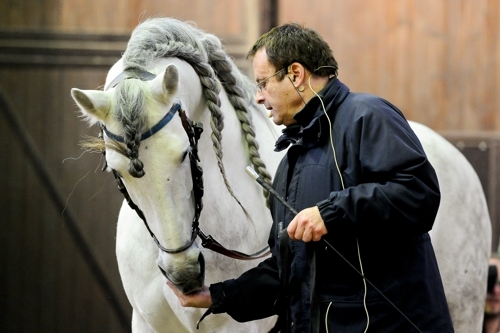
There’s nothing you can ever do wrong with praising, only watch out to be prompt with it – getting a treat out of your breeches while you are riding and reaching over to give it to him will probably take way too long. In groundwork, treats can be immensely useful.
Praise can be a a whispered “Good boy!” from the saddle while you are riding manoeuvres, not to get distracted or risk the moment from falling apart. It may be a reassuring scratch on the withers. It can also be dropping the reins and enthusiastically patting your horse on the neck, praising it loudly for a big thing: like a new move executed right for the first time.
Or it can mean, big pats, followed by getting out of the saddle (the ultimate relief) and more patting and scratching and cooing. The cool-down can also be done on foot when your horse has just shown extraordinary stuff. And your horse will feel like a star!
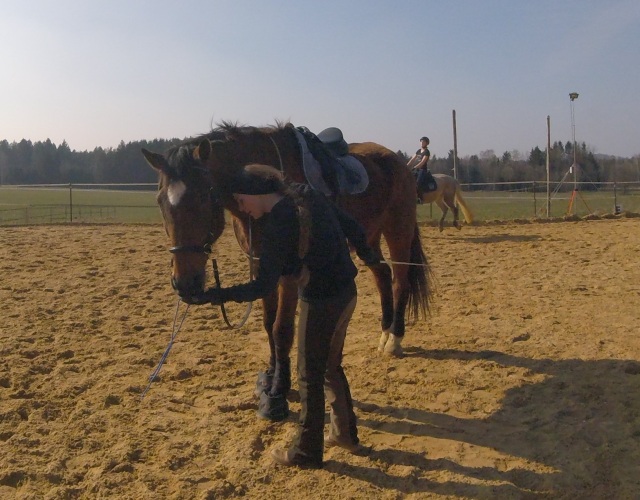
I always try to keep Gustav Steinbrecht’s words in mind when training horses: “Merke dir wohl, Fortschritt macht dein Pferd nur wenn du auf gutem Fuße mit ihm stehst.” – which translates roughly to: “Remember well, your horse will only make progress if you are on good terms with him.” – from his book “The Gymnasium of the horse”.
